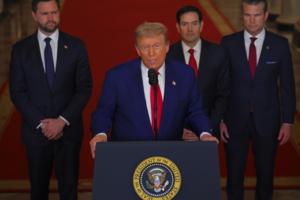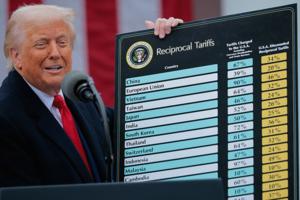Politics
/ArcaMax

Trump pressures Iran to make peace, threatening more US strikes
WASHINGTON — U.S. President Donald Trump said in an address to the nation that U.S. strikes had “completely and totally obliterated” Iran’s three main nuclear facilities, and threatened further military action if Tehran did not make peace with Israel.
“This cannot continue. There will be either peace or there will be tragedy for Iran,...Read more

South Shore native nominated to 2nd highest post in US military
BOSTON — President Donald Trump’s administration nominated a South Shore native for the second-highest post in the military.
Marine Corps Gen. Christopher Mahoney, a Weymouth native, has been nominated to serve as the vice chairman of the Joint Chiefs of Staff at the Pentagon. He would replace U.S. Navy Adm. Christopher W. Grady, who has ...Read more

EU frets over US demands in trade talks it sees as unbalanced
The U.S. is demanding the European Union make what the bloc’s officials see as unbalanced, unilateral concessions as part of ongoing trade talks, setting up a tough decision over whether to move ahead with countermeasures if the terms of any deal don’t improve.
The best-case scenario remains an agreement on principles that would allow the ...Read more

Pakistan backs Trump for Nobel Peace Prize he's long craved
Pakistan said it will nominate U.S. President Donald Trump for the Nobel Peace Prize, a move that may annoy rival India while building stronger ties to Washington.
The recommendation is being made for Trump’s “decisive intervention and pivotal leadership during the recent India-Pakistan crisis,” according to a social media post on ...Read more

How Nevada's elections will change with new 2025 laws
LAS VEGAS — New laws from the 2025 legislative session aim to increase accessibility to Nevada’s elections and improve voters’ experiences.
Election reform was a major focus in Carson City, though bills that sought to drastically change Nevada’s elections were blocked by the governor, including legislation to implement voter ID ...Read more

Prominent Philly Democrats lining up for Dwight Evans' US House seat
PHILADELPHIA — Democratic interest in primarying U.S. Rep. Dwight Evans is getting louder.
State Sen. Sharif Street, the state Democratic Party chair, said Friday he is considering a primary run against the 71-year-old Philadelphia congressman who suffered a stroke last year.
“I’m weighing my options but I have a tremendous amount of ...Read more

Harvard nears 'mindbogglingly' historic US deal, Trump says
BOSTON — President Donald Trump said his administration has been holding talks with Harvard University and may announce a deal over the next week, potentially ending a standoff that has jeopardized billions of dollars of the school’s funding and ignited a rollicking legal fight.
“They have acted extremely appropriately during these ...Read more

Trump administration orders California to remove gender identity from sex ed
The Trump administration said Friday it has given California 60 days to remove all mention of gender identity from its federally funded sexual education curriculum or the state risks losing grant funding.
The directive comes a few months after the administration launched a probe into California’s Personal Responsibility Education Program, or ...Read more

With keeping Trump out of NYC a key issue in the mayoral primary, here's where candidates stand
NEW YORK — President Donald Trump has loomed large over this year’s mayoral contest, particularly as his administration has ramped up its mass arrests and deportations in New York, cut funding to universities and threatened a broad array of social and educational programs.
The stakes are high. Federal funds account for about $10 billion of ...Read more

Supreme Court joins Trump and GOP in targeting California's emission standards
WASHINGTON — The Supreme Court on Friday joined President Donald Trump and congressional Republicans in siding with the oil and gas industry in its challenge to California's drive for electric vehicles.
In a 7-2 decision, the justices revived the industry's lawsuit and ruled that fuel makers had standing to sue over California's strict ...Read more

Supreme Court allows civil lawsuits against Palestinian groups
WASHINGTON — The Supreme Court backed a 2019 federal law Friday meant to allow lawsuits against the Palestine Liberation Organization and Palestinian Authority for damages from terror attacks.
Congress passed the law stating the two organizations could be subject to lawsuits in the United States for activities such as processing payments for ...Read more

Making NYC affordable: Where the mayoral primary candidates stand on the housing crisis
NEW YORK — New York City is facing intertwined housing and affordability crises, with record rents and historically low apartment vacancy rates. About half of households struggle to pay for the basics while a quarter live in poverty.
Within the debate over affordability, finding ways to create more affordable housing has become a major ...Read more

Senate GOP mulls shielding rural hospitals from Medicaid cuts
WASHINGTON — Senate Republicans say they are looking for ways to safeguard rural hospitals from proposed cuts to a key Medicaid funding method, amid concerns from the powerful hospital lobby and others that the budget reconciliation bill could force many facilities to close.
The draft text that the Senate Finance Committee released this week ...Read more

DHS keeps denying access to members of Congress attempting oversight. Experts say it's illegal
WASHINGTON — The day after immigration raids began in Los Angeles, Rep. Norma Torres, D-Calif., and three other members of Congress were denied entry to the immigrant detention facility inside the Roybal Federal Building.
The lawmakers were attempting an unannounced inspection, a common and long-standing practice under congressional oversight...Read more

Preparations for NYC Election Day heat wave blasted as inadequate by Cuomo
NEW YORK — Hundreds of polling sites in the city that do not have air conditioning systems will be equipped with electric fans on Tuesday, when temperatures are projected to soar into the 100s as New Yorkers head out to vote in the local 2025 primary elections.
But the ramped-up heat precautions were criticized as inadequate by mayoral ...Read more

White House: Maryland families would be 4th-largest beneficiary of Trump tax bill
Maryland ties for fourth among 50 states in terms of the financial benefits average families would see if Congress passes President Donald Trump’s tax bill, according to a White House news release.
Citing a state-by-state analysis from the president’s Council of Economic Advisers, the Wednesday release lists the anticipated increases to ...Read more

Trump delays Iran attack decision as Steve Bannon visits White House
President Donald Trump delayed his decision on whether attack Iran for two weeks following a Thursday sighting of Steve Bannon at the White House. The visit comes amid big divisions in his MAGA movement over U.S. involvement in foreign wars.
“There’s a substantial chance of negotiations that may or may not take place with Iran,” Trump ...Read more

TikTok deal gets another extension from Trump
President Trump on Thursday signed an executive order giving TikTok a 90-day extension to work out a deal with the U.S. government that addresses security concerns over the app's ties to China.
Significant pressure has been placed on TikTok, known for its popular social video app, after a law was signed in 2024 that required TikTok's Chinese ...Read more

NRA leader agreed to pay $500,000 to settle lawsuit tied to 2020 election, records show
DETROIT — Bill Bachenberg, a supporter of President Donald Trump and a leader within the National Rifle Association, agreed to pay $500,000 to settle a Michigan lawsuit that alleged he refused to compensate a cybersecurity expert who failed to uncover fraud in the 2020 election, according to a court filing.
A dismissal motion submitted in ...Read more

Trump tells Supreme Court no need to rush to consider tariffs
President Donald Trump’s administration urged the U.S. Supreme Court to turn away a request for fast-track review of his sweeping tariffs, saying the justices should give lower courts more time to weigh in.
The filing comes a day after two family-owned businesses asked the court to hear their challenge on an unusually quick schedule, without ...Read more
Popular Stories
- US officials prepare for possible strike on Iran in coming days
- Harvard nears 'mindbogglingly' historic US deal, Trump says
- Prominent Philly Democrats lining up for Dwight Evans' US House seat
- South Shore native nominated to 2nd highest post in US military
- Senate GOP mulls shielding rural hospitals from Medicaid cuts























































